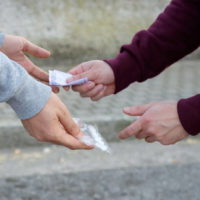Possession Vs. Possession with Intent to Sell

The criminal penalties associated with an attempt to sell or distribute a drug can be confusing, as you may be charged with possession with intent to sell even if you honestly had no intention to sell any of the substance. The following is an explanation of Virginia’s classification of various controlled substances as well as the difference between possession and possession with intent to sell or distribute.
Schedules of Controlled Substances in Virginia
There are six classifications of controlled substances in Virginia, Schedule I, Schedule II, Schedule III, Schedule IV, Schedule V, and Schedule VI. The criminal penalties for possession or possession with intent to sell these controlled substances depend on the quantity in possession and the classification or schedule of drug. The lower the number, such as Schedule I controlled substances, the harsher the penalties and more serious the consequences, as per Virginia § 18.2-248. Here are a list of examples of the types of substances in varying Schedules: Schedule I includes heroin and ecstasy; Schedule II includes cocaine, methamphetamine, and oxycodone; Schedule III includes hydrocodone and anabolic steroids; Schedule IV includes Valium, Schedule V includes codeine cough syrups, and Schedule VI includes other prescription drugs, or more specifically, according to Virginia § 54.1-3455, “Any drug, not included in Schedules I, II, III, IV or V, required by federal law to bear on its label prior to dispensing, at a minimum, the symbol ‘Rx only,’ or which bears the legend ‘Caution: Federal Law Prohibits Dispensing Without Prescription’ or other similar warnings.“
Possession Alone
If you are charged with a drug crime, possession alone is likely the charge that carries the least penalties. Virginia and federal charges for possession of controlled substances are severe, but possession alone most likely means that you were not being charged with a substantial amount of controlled substances. Even if a drug is not found on you, it may be decided that it is in your possession because it is within your control. To be charged with possession, the drug must have been found on your person, your vehicle, in your home, or other property.
Possession With the Intent to Sell or Distribute
Intent to sell can be construed one of two ways: 1) with actual evidence that you were attempting to sell the drug, such as eye witness statements, being caught in the act, drug paraphernalia, customer accounts, large amounts of money, and packaging, or 2) the amount of the drug in your possession was too large to be of personal use. Quite often, it is this second scenario that law enforcement will use. You can also be charged with intent to sell or distribute even if you do not actually have any drugs in your possession (or drugs in your control).
Contact a Loudoun County, Leesburg, Winchester, Fairfax, and Prince William Drug Crimes Attorney Today for Immediate Help
If you have been charged with any type of drug crime, do not hesitate to contact an attorney immediately. Whether the charge is a misdemeanor or a felony, the penalties can be life-altering. Call the Loudoun County, Leesburg, Winchester, Fairfax, and Prince William drug crimes criminal defense attorneys of Simms Showers, LLP today at 703-997-7821.
Resources:
law.lis.virginia.gov/vacode/title54.1/chapter34/section54.1-3455/
vacode.org/2016/18.2/7/1/18.2-248/
Disclaimer: This legal alert is provided for general information purposes only and is not a substitute for legal advice particular to your situation. No recipients of this memo should act or refrain from acting solely on the basis of this memorandum without seeking professional legal counsel. Simms Showers LLP expressly disclaims all liability relating to actions taken or not taken based solely on the content of this memorandum. Please contact Caleb Kershner or Ben Mann at cak@simmsshowerslaw.com, wbm@simmsshowerslaw.com, or (703) 771-4671 for greater details concerning how this information may affect you.
